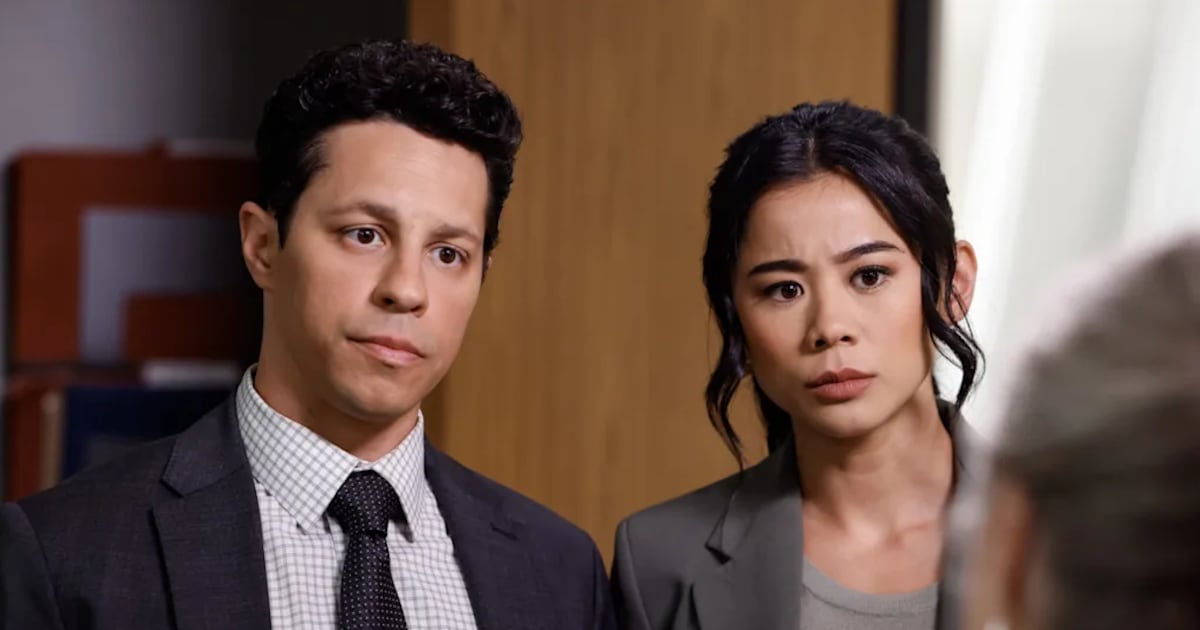This is a preview of our pop culture newsletter The Daily Beast’s Obsessed, written by senior entertainment reporter Kevin Fallon. To receive the full newsletter in your inbox each week, sign up for it here.
It is still marginally—OK, very—shocking to see gay people on a screen. But to see only gay people? Well, you could bowl me over with the meager force of a barely audible Ariana Grande whisper-sing, it’s so surprising. Don’t tell Marjorie Taylor Greene about Fire Island. She might release a video about banning movies, no screens—hell, maybe even fires and islands—forever.
The new film, which premiered Friday on Hulu just in time to kick off Pride Month, begins with the patent dismissal of “hetero nonsense.”
Finally, a political cause to get behind. Farewell football! Pour one out for the end of craft beers. You had a good run, couples walking so slow it’s astonishing you’re making any forward progress while holding hands on a small sidewalk so that nobody can get around you. The utopia has arrived: Never having to find out who, exactly, Jack Harlow is or what a Post Malone song actually sounds like.
Those are the superficial perks of the world created in Fire Island, which was written by and stars Joel Kim Booster. It’s about a group of gay friends who convene every summer for a week on the titular mecca, the New York City-adjacent beachside destination the LGBTQ community flocks to in droves each year once Speedo weather arrives. In an opening voice-over, Booster’s character, Noah, refers to Fire Island as a “sacred place.”
It’s where he and his friends, including Bowen Yang’s Howie and Matt Rogers’ Luke, fortify their friendship bond into family. It’s where they can feel free to be unabashedly gay—to hook up, to be flamboyant, to talk in their own vernacular, and to make references to Cherry Jones without ever having to explain themselves or, worse, who the esteemed character actress is.
Truly, the only character I saw in the film who might be heterosexual was a woman who worked at the grocery store, where patrons peruse the aisles for $11 boxes of Cheez-Its in nothing but thong bathing suits and sandals.
Fire Island is a Very Gay Movie. Finally!
An emotional climax takes place during a karaoke rendition of “Sometimes” by Britney Spears performed in three-part harmony. Marisa Tomei’s courtroom monologue from My Cousin Vinny is performed verbatim by two characters as if they are reciting religious text at church. It’s called cinema, and I feel seen.
All of this is what makes Fire Island so beautiful. It’s also what, for some, will make it so annoying.
I’m not talking about homophobes who can’t fathom the idea of gays running amok on an island. There’s actually a strange tension that will inevitably snap once more people see the film and the—pardon my use of the world’s worst word—discourse arrives.
As with every major piece of gay content, there will be those who will cringe at the depiction of casual sex, drug use, and other things that they think may not represent the community favorably, or that it leans into unsavory cliches about promiscuity, or that it doesn’t represent whatever particular identity of the queer experience the person complaining identifies with.
On the flip side, there will be those who might find it too pandering to a mainstream audience. They might argue that it’s too eager to over-explain gay colloquialism or behavior to a “straight” or uninitiated audience. Or, even, that its storytelling, particularly when it comes to love and romance, is disappointingly conventional.
All of those points are fair and all of those points are exhausting. Their arrival is so expected that the door is already open to usher them in, where they can be discussed alongside the “kink at Pride” and “corporations exploiting Pride Month for profit” debates until the cacophony gets the party shut down.
The question is whether to give them credence, or to let the movie be what it is: gay, slight, and fun!
The “hetero nonsense” that Noah is scoffing at in the film’s opening is actually the idea that happiness is found in marriage, or at least monogamy and a long-term relationship. Fire Island is a twist on Jane Austen’s Pride and Prejudice, set among the different classes of friend groups who co-exist at the vacation destination for the week.
There are lines like “the monogamy-industrial complex rears its ugly head,” as characters like Noah treasure their independence and think power and hotness translates into casual sex and being untied. (A modern, horny twist on Elizabeth Bennett.) But then there’s Howie, who craves the meaningfulness of a deep partnership and wants the rom-com kind of love that Noah thinks is only for the straights.
Both of these ideas are challenged as the movie unfolds, hitting the beats we’re all familiar with after so many Austen adaptations over the years—just, in this case, unfolding at underwear parties and amidst drama over a sex tape that was filmed while someone was incapacitated on the party drug ‘G.’
What Fire Island can’t seem to figure out, though, is whether it’s rejecting those Austen ideas of romance, subverting them, or, in its own way, embracing them.

Noah’s Elizabeth Bennett has his Mr. Darcy in Conrad Ricamora’s Will. Their characters are heinous to each other. (Stepping in for a little bit of film criticism here: Almost too heinous. It’s really unpleasant and almost not believable, even understanding that’s the point of this well-trodden character dynamic.) But you know how Pride and Prejudice ends, so you know the journey that we’re going to be going on here.
The magic, then, is in the gayness of it all. There are really interesting conversations touching on ideas of shame, internalized homophobia, and sex that will be so refreshing to many people, particularly in the context of modern romantic expectations. There is also a focus on sex that might be isolating. Sex is an incredibly important part of gay culture. Except when it isn’t at all. Which is some of the time. Or, rather, never. Except it always is. Only, not when it isn’t.
There are as many gay men who are terrified of Fire Island and its reputation as there are those who count down the days each year until their pilgrimage. But that isn’t this story, and that should be the fascinating question that this movie might answer. Will we actually, and finally, let a gay story just be the one single story that it is, and not demand that it be every gay story, all at once?
The bottom line is that Fire Island is perfectly nice and easy to watch, with a strong enough sense of itself to put a line like “can I trade someone a Crest White Strip for a PrEP” into a romantic comedy. So for that, at least, we’re grateful.







